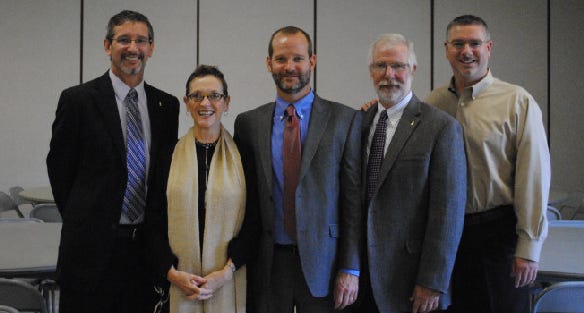
Jim Wilson will tell you he’s a numbers guy. But he’s also a farmer at heart, so when the opportunity to meld the two arose, he left his finance and accounting position with Gerber Products Co. to return to his home farm in Yale, Mich.
Wilson, a fourth-generation farmer, is now retired, but he and his brother Fred took over a farming operation that started with their great-grandfather’s 40 acres. Jim grew up working on the family farm owned and operated by his father, Russel, and uncle Howard — the original Wilson Brothers Farm.
When the farm eventually transitioned to Jim and Fred, it was 500 acres, and they expanded it to 2,100 acres of corn, wheat and soybeans — 50% food-grade varieties. Jim is proud that his nephew Scott Wilson has transitioned into the operation and is farming with Fred.
For his commitment to the land, adoption of best management practices, high level of involvement in commodity and community leadership positions, and meticulous management, Jim Wilson has been named a Michigan Farmer Master Farmer — the highest honor in the ag industry.
“Jim parlayed his college education in finance to be a business farmer — not just a grower,” says Jim’s son Chris, who nominated him for the award with Scott Wilson and Janna Fritz, executive director of the Michigan Soybean Promotion Committee.
“Us kids would sometimes tease him about being a ‘dual-bean counter.’” Chris adds. “He was an early adopter of marketing strategies — locking in prices before the crop was even planted. And he was a prodigious record keeper and analyst.”
Because of the pandemic, the awards luncheon at the Great Lakes Crop Summit has been canceled, but Jim will be awarded at next year’s event, along with the 2022 winners.
Humbled and surprised, Jim says the nomination was a “covert operation going on right under my nose. It’s definitely an honor. … I never expected this.”
Growing up
Jim attended college at Central Michigan University at the urging of his aunt Florence Mortimer, who was an educator. “Russia had put up Sputnik, and there was a push for higher education in math and sciences,” he says.
During his second year of college, he met Rene` Rousseau of Munising, who would become his spouse of 58 years. Two sons, Jim and Chris, were born before he graduated college and took a position with Gerber, a baby food company, as an administrative trainee.
That job would then take him to New York, where another son, Chad, was born, and later their daughter, Elizabeth, joined the family.
Jim’s dad retired in 1976, and Fred joined the farm with Howard for a couple years. “Howard was retiring, and my brother called to discuss the possibility of forming a farming partnership,” Jim says. “I needed a change, so in 1978, I left my 12-year career with Gerber and began a new chapter in our lives.”
Wilson Brothers Farm was conservative in buying land and marketing, making sure the numbers worked. “I didn’t market beyond 50% of expected yield,” Jim says.
They were quick to tile ground or invest in good equipment, but only after great economic review.
“My brother and I got along famously by making mutual decisions,” Jim says. “My strengths were in the business/marketing side, and Fred’s strengths were in the mechanical and maintenance side.”
Jim created a series of Excel spreadsheets, with the help of his son Chris to track the farm’s “Activity Based Costing,” allowing him to understand his specific costs and profitability by specific area: crop, soil type and tiled/non-tiled ground.
He used the charts and graphs from Excel to manage the farm and to also prepare for their annual trip to the bank to secure the necessary letter of credit. “Each year, the banker said the same thing, ‘You could make more money being a farming consultant than an actual farmer,’” Chris recalls.
Jim credits a rotation of corn, soybeans and wheat for soil health and consistent yields, while changing chemistries to keep resistant weeds to a minimum.
Soil sampling and variable-rate application of inputs was just taking root when Jim was farming, but he is proud that Scott and Fred have embraced and adopted those practices.
All wheat was no-tilled, as well as some of their soybeans.
“Sustainability is key,” Jim says. “Scott is the fifth generation, but it’s really just a blink in time in the continued proper management of the soil. You cannot abuse the soil. In past years, animal-based manure, hay and pasture were in the rotation. These practices are no longer used, creating other challenges.”
Some food companies are demanding sustainable protocol, showing good nutrient management. Jim believes farming for bushels or tons per acre will become more complicated as food companies dig deeper into the food chain.
“They might be wanting different levels of protein in soy, or certain milling properties in wheat,” he says. "Growing for specific traits — what food processors and consumers want — is the way of the future. It’s what our commodity is bringing to the nutritional or industrial world.”
Outreach
To keep up with best farming practices, Jim read farm-related publications, attended ag educational seminars, planted variety test plots for Cooperative Extension and joined commodity organizations.
Jim recalls a 1988 visit to a French family, Demoury/Deville, whose son was an ag exchange student with the family. It began a 32-year relationship that remains today.
“In visiting, I remember the farmer saying the sprayer was the most important implement on the farm,” says Jim, noting they had tracks and tram lines in their fields. “We really looked at that idea. In high management, you’re over fields multiple times. We developed our own tram lines in wheat. Then we used soybeans with narrow rows — leaving the same imprint on each field.”
Jim has been a steady member of many farm organizations, both while he farmed and in retirement. He became a board member of the Michigan Soybean Association in 2004. He’s also served on the Michigan Soybean Promotion Committee, the United Soybean Board, the U.S. Soybean Export Council and currently serves as treasurer for the World Initiative for Soy in Human Health (WISHH).
“Jim has traveled across the globe to educate and advocate for additional soybean trade and soybean use in developing nations, most recently in Cambodia and Myanmar,” says Dave Williams, who is the USB board liaison with WISHH and a 2017 Master Farmer.

WILSON FAMILY: Jim Wilson is a 2021 Michigan Master Farmer. Pictured are (from left) son Jim, wife Rene`, son Chad, Jim and son Chris. Not pictured is daughter Elizabeth.
Jim, like both his parents and grandfather, was elected as the Fremont Township supervisor for many years. He was also the township tax assessor during the time when farmland values were going down and parcels were being sold off for development or recreation. That trend got him interested in farmland preservation strategies, and he attended a multiday trip out East to learn programs that could benefit Michigan growers. He was also involved with the Michigan Township Association.
“I’m very fortunate to have met a lot of wonderful people in my life, and that’s really what’s most important,” he says.
Rene was employed for 20 years with the Sanilac County Health Department alcohol and drug program. She spent the past 10 years before retirement working as a bereavement coordinator for hospice.
In their free time, they enjoy traveling to the Southwest and other parts of the country where they look forward to hiking and exploring natural sites, museums and cultural centers.
Master Farmer profile
Name: Jim Wilson
Farm: Wilson Brothers Farm — corn, wheat, soybeans
Nominator: Janna Fritz, executive director Michigan Soybean Promotion Committee, Chris Wilson, Scott Wilson
Ag and community leadership: Michigan Soybean Association; Michigan Soybean Promotion Committee three years; United Soybean Board, three years; U.S. Soybean Export Council, one year; Soy Nutrition Institute; Michigan Farm Bureau; Michigan Corn Growers Association; Fremont Township supervisor and assessor, 30 years; founding member of the Sanilac County Supervisors Association; and treasurer for the World Initiative for Soy in Human Health, six years.
About the Author(s)
You May Also Like






